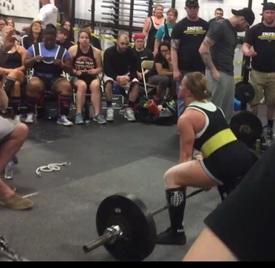Lower Weight High Reps, or Higher Weight Low Reps
Options

kgavins25
Posts: 24
For a female, beginner..... Would like to get some advice on weight lifting to use as weight loss. As i have read on many post, you can't gain muscle in deficit, only loose fat to show more muscle and have that "toned look". Is there a preference or proven success to lift with higher weights and less reps or to use lower weight with more reps. Which is better for weight loss (cardio)? Does it make a difference?
0
Replies
-
My thoughts.
Eating at a deficit=weight loss.
Cardio to keep your heart healthy. Heavy weights to transform your body, look and feel strong.0 -
Someone on this site suggested the book "The New Rules of Lifting for Women: Lift Like a Man, Look Like a Goddess"
It's a great book that explains all about why, how much, how many, what to eat, all specific to women. I dowloaded the e-version, but am going to buy the paperback. (Amazon, Barnes & Noble have it) because it refers back to specific page numbers, and the e-version's page numbers are dependant on your device, font size etc.
There's a lot of fear that you might "Bulk up" and this book will tell you how to get toned and fit without looking like the Incredible Hulk (unless your skin has a greenish tinge, then you're probably out of luck :happy: )0 -
Higher weights - less reps.
Think of this - my purse probably weighs 5 lbs or more - I can lift that up and down all day long, I'm not getting fit or toned. Or anything else.
I also recommend the New Rules of Lifting book - I haven't followed it yet, but it is very good and informative reading. Explains a lot in very easy to understand terms.0 -
I would think as a beginner that you would start with lighter weights/more reps just so you can learn proper form which is more important than lifting heavy. Once you learn how to properly lift weights, then increase to heavier weights/less reps. Going to heavy weights too soon could lead to injury due to improper form.
i.e. You shouldn't be throwing your whole body back and forth to do a bicep curl because the weight is too heavy.
I have also heard that "The New Rules of Lifting for Women: Lift Like a Man, Look Like a Goddess" is a great book ! 0
0 -
Check out the Eat, Train Progress group. Lot's of great info in there.0
-
I personally enjoy the Strong Lifts 5x5 program for its simplicity, and have the book NROLFW, and really appreciate the information and recipes.

I still have weight to lose, and heavier with fewer reps seems to be doing the trick. 0
0 -
I would think as a beginner that you would start with lighter weights/more reps just so you can learn proper form which is more important than lifting heavy. Once you learn how to properly lift weights, then increase to heavier weights/less reps. Going to heavy weights too soon could lead to injury due to improper form.
i.e. You shouldn't be throwing your whole body back and forth to do a bicep curl because the weight is too heavy.
I have also heard that "The New Rules of Lifting for Women: Lift Like a Man, Look Like a Goddess" is a great book !
1. You don't start off doing heavy lifting by throwing 100 lbs on a bar for squats. You start with an empty bar and once you get your form down, then you progress with heavier weights.
2. Heavy lifting programs (5x5's or 3x5's) aren't going to have isolation exercises like bicep curls. They concentrate on big compound moves that incorporate your whole body.
3. I prefer the 5x5 route and followed stronglifts. I went from an empty bar, to squatting 165lbs.0 -
If your goal is to build muscle, the only way to go is heavy weights with low reps and make sure your weights get heavier and heaver!
Also make sure you are doing compound moves, like olympic lifts (power cleans, press, snatch, clean and jerk, deadlift, squats) and NOT isolation moves (like bicep curls, leg extensions, or anything that uses a machine). Those compound moves work your entire core from shoulders to hips, and that's what will really trim you down (and give you amazing power and strength).
You should work with someone to learn form, and how to increase weight safely.
There are some programs I hear people talk about a lot, I've never looked into them myself but they get rave reviews here. New Rules of Lifting for Women, Stronglifts 5x5, and Starting Strength.0 -
The short answer is higher weights/lower reps. Bigger weights are what will tear your muscle fibers so that when you rest and recover (which all weight lifters MUST do), you'll rebuild more muscle tissue. If you're worried about getting "too bulky", you're a woman: you and I don't have the testosterone levels necessary to get really big. Also, the more muscle you build, the more calories you burn just going about your daily routine. HIGHER WEIGHTS!!!0
-
My thoughts.
Eating at a deficit=weight loss.
Cardio to keep your heart healthy.
Heavy weights to transform your body, look and feel strong.
Totally agree, I've just finished stage on of New Rules of Lifting for Women (NROL4W) and got to eat more and lost 8" in two months.
As it has been mentioned - you start light then build up to heavy weights when you have the correct form - and heavy is relative, what is heavy for me is probably light for someone else. :blushing:
Just make sure you take photos and measurements - the scale didn't move for me in those two months - but I look so much better, it's been totally worth it.0 -
Realistically, both are fine, as long as you have the right definition.
"High reps" is 10-15. "Low reps" is 3-5.
Either way, as long as you're hitting failure in that range you're really going to be fine as far as preserving muscle etc. There will be differences for hypertrophy and strength but IMO it's not really worth worrying about unless you have specific goals for that.0 -
There are definately benifits to both. I think it really depends on your body type and more importantly, your personality.
Why personality? Because no diet of exercise plan will work for anyone if they don't stay on it because they're not satisfied with the results. How much patience do you have??? How determined are you??? How educated about diet and exercise are you???
If you need to see results right away, you HAVE to hit it HARD or you may quit. GOOD diet it key, lots of cardio regardless of which weight lifting stratagy you you is a MUST. You can't see all your hard work and muscles if they're covered by fat~
Now to answer your question, in general:
low weight, high reps = toning
high weight, low reps = shaping and definition
I recommend getting a trainer if you can afford one, it is very important to use good form when lifting any weights to get the most of your work out and to avoid injury. You can even take a weight lifting class at a junior college = cheap weight lifting guidance. Fitness RX and Muscle and Fitness HERS are great magazines for information, diet and exercise info and inspiration.
Hopr this helps and don't forget, MUSCLE WEIGHS MORE THAN FAT! So when you start lifting, don't be discouraged if your weight loss slows down a little. You'll be losing fat but gaining fat burning muscle! Good Luck!0 -
Now to answer your question, in general:
low weight, high reps = toning
high weight, low reps = shaping and definition
No. This is absolutely wrong. This is an extremely common and nonsensical myth.0 -
Thanks everyone for the advice. These are great tips.0
-
Realistically, both are fine, as long as you have the right definition.
"High reps" is 10-15. "Low reps" is 3-5.
Either way, as long as you're hitting failure in that range you're really going to be fine as far as preserving muscle etc. There will be differences for hypertrophy and strength but IMO it's not really worth worrying about unless you have specific goals for that.
This made the most sense. High reps for me are the 8-12 rep range and low is 6-8 but I not a beginner and have different goals. There is NO one perfect program out there but in the beginning you should focus on full body workouts with compound lifts as the focus. As you become more experienced you can tweak and add things.
Strong Lifts and NROLFW are what 98% of the forums recommend. They are solid reputable starting points. Also check out Nia Shanks and her website to give you more ideas/other options.0 -
Now to answer your question, in general:
low weight, high reps = toning
high weight, low reps = shaping and definition
Low weight, high reps builds endurance and stamina; high weight, low reps builds power and strength. Muscles do not need to increase in size to increase in endurance, but they do need to increase in size to build strength. If you want to increase your muscle mass, high reps will only get you to a certain point.
I agree with Jonnythan, though, that if your definition of high reps is 10 instead of 5, for a beginner just wanting to work on BF% both will probably work just fine. I'd define high reps as over 20, though. An example of a high rep conditioning program would be like the 30 day squat challenge. Endurance programs add reps, strength programs add weight. If you want to build muscle mass, you need to do a strength program.
The difference between "toned" and "shaped, defined" are just a difference in body fat percentage.0
This discussion has been closed.
Categories
- All Categories
- 1.4M Health, Wellness and Goals
- 396.9K Introduce Yourself
- 44.2K Getting Started
- 260.9K Health and Weight Loss
- 176.3K Food and Nutrition
- 47.6K Recipes
- 232.8K Fitness and Exercise
- 453 Sleep, Mindfulness and Overall Wellness
- 6.5K Goal: Maintaining Weight
- 8.7K Goal: Gaining Weight and Body Building
- 153.3K Motivation and Support
- 8.3K Challenges
- 1.3K Debate Club
- 96.5K Chit-Chat
- 2.6K Fun and Games
- 4.5K MyFitnessPal Information
- 16 News and Announcements
- 18 MyFitnessPal Academy
- 1.4K Feature Suggestions and Ideas
- 3.1K MyFitnessPal Tech Support Questions












